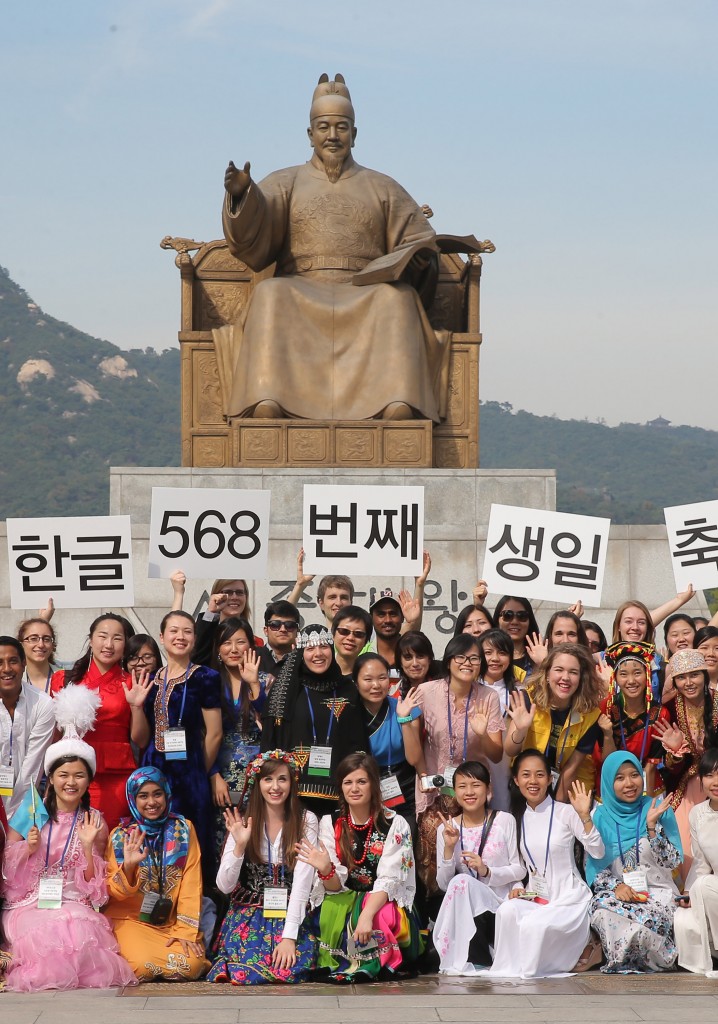- California Assembly OKs highest minimum wage in nation
- S. Korea unveils first graphic cigarette warnings
- US joins with South Korea, Japan in bid to deter North Korea
- LPGA golfer Chun In-gee finally back in action
- S. Korea won’t be top seed in final World Cup qualification round
- US men’s soccer misses 2nd straight Olympics
- US back on track in qualifying with 4-0 win over Guatemala
- High-intensity workout injuries spawn cottage industry
- CDC expands range of Zika mosquitoes into parts of Northeast
- Who knew? ‘The Walking Dead’ is helping families connect
‘Hangeul’ celebrates 568th Birthday

Foreign students of the Korean language institute Sejong Hakdang pose in front of the statue of King Sejong at Gwanghwamun Square in downtown Seoul on Oct. 8, 2014, to celebrate the 568th anniversary of the invention of the Korean alphabet, Hangeul, and Hangeul Day, which falls on Oct. 9. Sejong, the fourth king of the Joseon Dynasty, created Hangeul in 1446. (Yonhap)
SEOUL (Yonhap) — South Korea will observe a national holiday Thursday to mark the promulgation of “Hangeul” with a variety of events highlighting the history and value of the Korean alphabet, organizers said Wednesday.
Considered one of the simplest and most logical language writing systems in the world, Hangeul was invented by King Sejong of the Joseon Dynasty (1392-1910) in 1443 and promulgated three years later to replace an older writing system based on the Chinese script.
The main ceremony to celebrate Hangeul Day will be held at the Sejong Center for Performing Arts in central Seoul on Thursday morning with 3,000 government dignitaries, foreign diplomats and leaders of Hangeul-related organizations attending.
Ten people will be honored during the ceremony for their contribution to the development of Hangeul, according to the government.
They include the late American missionary Homer Hulbert (1863-1949), who advocated for Korean independence from Japanese colonial rule.
He was chosen to be the winner of the South Korean government’s Gold Crown Order of Cultural Merit for writing the first-ever Korean-language textbook in 1890 as an educational adviser to the Korean Empire and contributing to the study of Hangeul, the Ministry of Culture, Sports and Tourism said.
Hulbert’s great-grandson will receive the medal on his behalf, the ministry added.
A variety of cultural events are underway or scheduled this week nationwide in celebration of Hangeul Day.
At Gwanghwamun Square, a ceremonial plaza in central Seoul, the culture ministry on Tuesday kicked off a Hangeul festival featuring various exhibits, performances, a fashion show and a Hangeul writing contest for foreigners. The festival is scheduled to run till Friday.
Five Seoul city buses carrying typographic Hanguel designs will be put into operation for a month from the holiday, according to the ministry.
Also on Thursday, the National Hangeul Museum will open its doors to the public after nearly three years of construction.
Located inside the compound of the National Museum of Korea in the Yongsan district, the museum will consist of exhibition rooms, a library, a cafe and a Hangeul-themed playground for children and a room for teaching Hangeul to foreigners.
The Seoul metropolitan city will hold an exhibition of some 50 hand-painted postcards depicting the beauty of the Korean alphabet at Cheonggye Plaza in central Seoul. The postcards were chosen from those sent for a contest hosted by the city government to help increase the public’s interest in their own writing system.
The governments of Daegu and South Chungcheong Province will host competitions related to Hangeul.
Hangeul Day was initiated in 1926 by a group of Korean-language scholars as part of their efforts to preserve the written language under the Japanese colonial rule, during which Japan banned its use and implemented Japanese as Korea’s official language.
The day was designated as an official holiday in 1949, four years after Korea was liberated from Japanese rule, but excluded from the list of public holidays in 1991 on the grounds that too many holidays would adversely affect the national economy.
The government re-designated the day as a national holiday last year with the rise of public attention toward the historical and international value of Hangeul.















